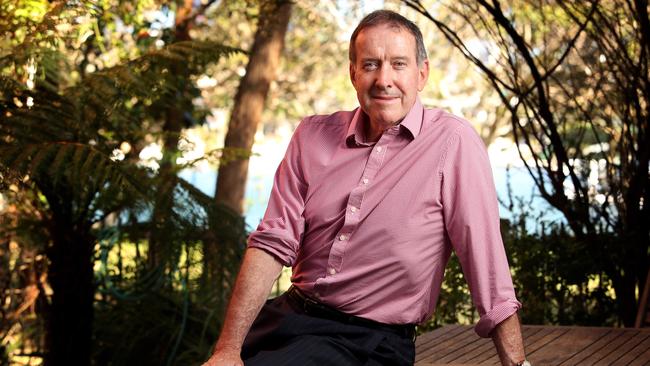Cabinet papers 1992-93: Turnbull ‘must take reins on reconciliation’
Our longest-serving indigenous affairs minister says Malcolm Turnbull must take control of a moribund process.

Australia’s longest-serving indigenous affairs minister has called for Malcolm Turnbull to seize control of a moribund relationship with Aboriginal and Torres Strait Islanders, describing the state of indigenous disadvantage as “truly a national embarrassment of successive governments”.
Robert Tickner, who held the portfolio for six years in the Hawke and Keating governments and was instrumental in both the 1992 response to the Royal Commission into Aboriginal Deaths in Custody and the 1993 native title legislation following the High Court’s Mabo ruling, said the matter was “not a job for an indigenous affairs minister”.
Instead it must be tackled, he said, by “a prime minister who can command the authority of the nation and his own agencies to engender a whole-of-government response”.
Mr Tickner called on the Prime Minister to establish an immediate audit of progress on the royal commission’s 339 recommendations, which he said “overwhelmingly … have not been implemented, either by the national government or by successive state and territory governments; worse still, governments of all political persuasions (have) covered up that failure”.
He said Mr Turnbull should use the 50th anniversary of the referendum which gave the commonwealth power in indigenous affairs, on May 27, to “capture the moment … to announce major policy commitments to address these issues”.
“I desperately hope he seizes the moment on this … but he needs to do so in a way that enjoys strong support from Aboriginal and Torres Strait Islander people as well as the opposition, as the referendum did almost 50 years ago,” he said, in remarks unveiling select 1992-93 cabinet papers of the Keating government.
“Keating did it on Mabo, someone’s got to do it now,” he said, describing indigenous affairs policy as “ineffectual, half-hearted and (without) the full resources of the commonwealth behind it, which was envisaged by the ’67 referendum”.
Mr Tickner also said he wanted to “add my voice to that of Paul Keating, in renewing the call for some kind of treaty or negotiated document with Aboriginal and Torres Strait Islander people, as one of the outcomes of the reconciliation process. This is what the parliament committed to properly consider when the reconciliation process was set up in 1991, and this issue will not go away”.
He said he was “not hung up on the word treaty” and it “need not be seen as an alternative to some form of constitutional recognition, as touchy as that’s proving to be”.
Mr Tickner called for bipartisan support of the royal commission recommendations, saying he believed Mr Turnbull was “a good and decent person who wants to do the right thing in Aboriginal affairs — but good intentions are not enough without the necessary leadership to generate real change” and said the issue was “above party politics, and one where Mr Turnbull and (Bill) Shorten could stand together”.
A key shift, he said, had to be moving away from “the old paternalistic way” of dealing with indigenous people, with the royal commission noting in 1991 that “unless those underlying issues were addressed there would be no change; it’s about the marginalisation of Aboriginal people which contributed to that incarceration”.
Mr Tickner said Mr Keating had “showed great political courage to deliver a just outcome for Aboriginal and Torres Strait Islander people after 204 years of the legal system denying their rights with that pernicious doctrine of terra nullius”. The former prime minister’s “diligence and dedication” over the 18 months following the High Court’s 1992 Mabo ruling establishing native title in the face of “the non-stop, torrid and at times vitriolic public attacks” had defined a critical time in Australian history, he said.
He said the Keating government had welcomed the High Court’s decision because it “removed a great barrier to reconciliation,” but that it knew from the outset “the huge challenge that lay ahead, with state and territory governments having traditional responsibility for and management of (the) issues, and an Australian community which did not yet understand the implications of the high court decision”.
Cabinet’s initial response to the ruling, which legally banished the flawed concept of terra nullius in favour of ongoing native title, was to seek ways of avoiding “continuing litigation by Aboriginal and Torres Strait Islander peoples seeking to establish title to particular land, with the uncertainty that would create”.
By year’s end, nine different responses had been considered, including extinguishment of title, but the course determined was to “feel the way forward”.
Lodgement of the Wik claim in June 1993 made considerations more complex, with cabinet noting in August its “disposition to adopt general principles … which would allow commonwealth legislation to allow states and territories to validate existing grants of interest in land which could potentially be invalid by reason of the existence of native title”.
The Wik claim on 35,000sq km in central Cape York covered mining and pastoral leases, national parks, crown and Aboriginal-held land as well as rivers, tidal areas and territorial seas. Cabinet had to mull the potential economic impact of a successful claim.
Mr Tickner said many younger Australians “would have no real appreciation of the vitriol, intolerance and scaremongering that was perpetuated in the debate”, making “Donald Trump’s election campaign look like the free-flowing milk of human kindness”.
Cabinet resolved that “to the extent that ... mining leases may be at risk of being rendered invalid by reason of the existence of native title … government will act to ensure that this does not occur”.
It noted the “significant increase in the perception of sovereign risk by resource investors” with large “potential opportunity costs to the nation”.
In September cabinet considered a two-stage approach for an economic and social justice package, which would address the fact the Mabo decision “would not make up for the disadvantages suffered by Aboriginal people from the dispossession of their land”.
Stage one would involve land and resource development proposals; stage two was to address relations between indigenous and non-indigenous Australians. “Proposals could be expected in relation to fundamental issues such as constitutional recognition of Aboriginal and Torres Strait Islander peoples, self-governing institutions, the maintenance of cultural practices and customary law, and a possible document or documents of reconciliation.’’
After the longest debate to have been held in the Senate, the bill passed on December 21, 1993.
Mr Tickner said Mr Keating’s famous Redfern Park speech six months after the Mabo decision “set the bar very high for the government to respond in a principled way to the judgment, and to meet the expectations of the reconciliation process”.
He said Mr Keating had “cemented his place in history” by seeking to reach “a negotiated outcome with Aboriginal leadership” rather than pushing for a deal with the states that failed to meet Aboriginal aspirations.
“This was the first time since 1788 when the Aboriginal people of the land were in face-to-face, genuine negotiation with a leader of a state or territory government,” he said, singling out then-ATSIC chair Lowitja O’Donoghue for being “magnificent as a leader”.
The result, he said, was an outcome “that both respected the high court decision and gave important additional rights and interests, while making sure that the rights of non-indigenous Australians were protected”, before finally being “painstakingly negotiated through the Senate” as the Native Title Act on December 21, 1993.
However, it came at personal cost, Mr Tickner said, including being sent a dead rat in the mail, an arson attack on his electoral office and death threats. He also revealed that during the tumult of early 1993 he was for the first time “reunited with my birth mother on the steps of the Sydney Opera House, and began a journey as transformative for me as the public journey was as Australia travelled the Mabo response”.



To join the conversation, please log in. Don't have an account? Register
Join the conversation, you are commenting as Logout